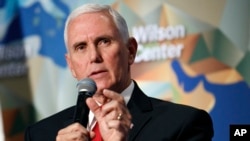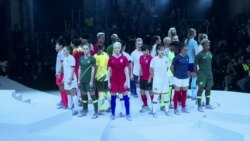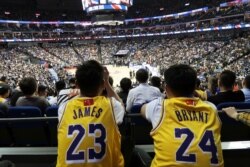In a hard-hitting speech on China, U.S. Vice President Mike Pence also criticized American companies for selling out this country’s values to protect their market access in the world’s most populous country.
“Far too many American multinational corporations have kowtowed to the lure of China's money and markets by muzzling not only criticism of the Chinese Communist Party, but even affirmative expressions of American values,” according to Pence.
“A progressive corporate culture that willfully ignores the abuse of human rights is not progressive – it’s repressive,” said Pence, who specifically mentioned two U.S. entities – athletic-wear maker Nike and the National Basketball Association.
WATCH: Pence Rebukes US Companies for Deals With China
The vice president, speaking at the Wilson Center in Washington, said Nike promotes itself as “social-justice champion,” but when it comes to Hong Kong, “it prefers checking its social conscience at the door.”
Pence said the brand’s stores in China removed from shelves merchandise of the Houston Rockets basketball team “to join the Chinese government in protest against the Rockets general manager’s seven-word tweet: "Fight for Freedom, stand with Hong Kong."
Pence also said some of the NBA’s biggest players and owners “who routinely exercise their freedom to criticize this country, lose their voices when it comes to the freedom and rights of other peoples.”
Pence added that in siding with the Chinese Communist Party and silencing free speech, “the NBA is acting like a wholly owned subsidiary of the authoritarian regime.”
Last week, star player Lebron James of the Los Angeles Lakers accused Rockets’ General Manager Daryl Morey of not being educated on the China-Hong Kong issue and raising what he called the “negative” side effects of free speech.
James faced additional criticism on Tuesday for screaming and walking off the basketball court during the playing of the American national anthem just before the Lakers’ season opening game against the Clippers in Los Angeles.
“I thought you were right to scold corporate America a bit” for bending to China, former Congresswoman Jane Harman, a Democrat, who is now president of the Wilson Center, told Pence following his speech.
Criticism of NBA players and coaches for dodging questions on China while they are, on the other hand, willing to speak out on domestic politic issues is fair, says Julian Ku, academic dean of the Hofstra University's law school.
The league’s leadership, however, “has actually refused to give in to Chinese demands that they fire or discipline Morey,” says Ku.
“They have lost quite a bit of money for their unwillingness to fire Morey,” Professor Ku tells VOA. “In this way the NBA should be praised as a model for companies like [hotel chain] Marriott that have bowed to China’s unreasonable demands” and not protected their employees’ rights and values.
Pence spent the bulk of his address criticizing China — referring to it as a strategic rival — for its authoritarian approach to society, the rule of law and international commerce.
The vice president accused China of attempting to export censorship by exploiting corporate greed and coercing American companies, especially in the entertainment industries.
Hollywood studios are accused of editing their content to appease China and avoid losing distribution channels in that country.
Pence warned that if authorities in Hong Kong respond violently to protestors — who the vice president urged to remain peaceful — that would make it much harder to conclude the pending trade pact between Beijing and Washington.
“We stand with you,” Pence said to the demonstrators in Hong Kong, which is a special administrative region, calling China’s response “antipathy to liberty.”
Pence said China is exporting its authoritarian-style surveillance technology to Africa, Latin America and the Middle East.
The vice president also accused Beijing of not living up to its promise to Washington to end exports of deadly fentanyl and synthetic opioids to the United States.
“The truth is also those deadly drugs continue to flow across our borders,” said the vice president.
The United States, Pence said, will not decouple from China, but the Chinese Communist Party has been decoupling from the wide world for decades.
Pence, who delivered a similar tough speech about China a year ago, lamented since that address, “Beijing still has not taken significant action to improve our economic relationship.”
The vice president concluded on a forward-looking note, expressing hope China would grasp America’s hand being extended for trans-Pacific cooperation.
“And we hope that soon Beijing will reach back this time with deeds, not words, and with renewed respect for America,” concluded Pence.
This year’s speech by the vice president, who has become the administration’s top-level hardliner on China, “is much focused on the U.S.-China relationship rather than on China’s actions in third countries, especially the developing world,” notes Agatha Kratz, associate director at the Rhodium Group, an independent private sector China-focused research and advisory firm.
“I find this speech more constructive than the last one, with more room left for cooperation,” Kratz tells VOA.













